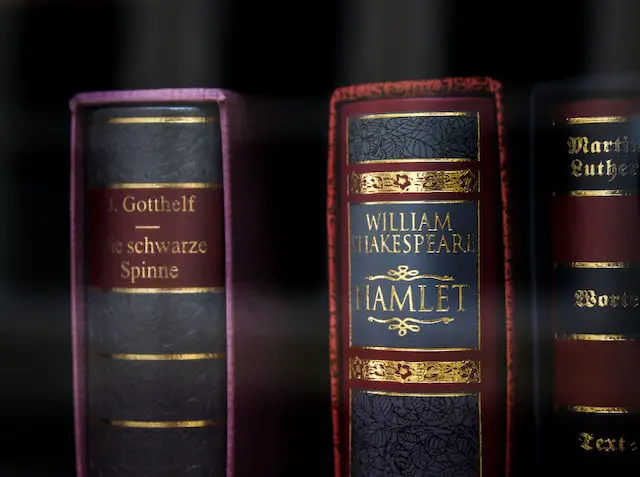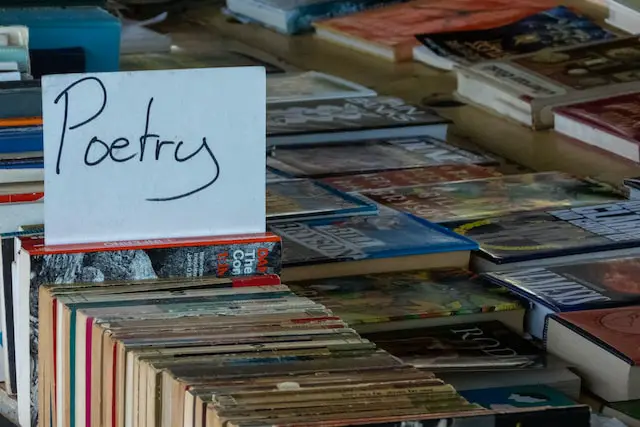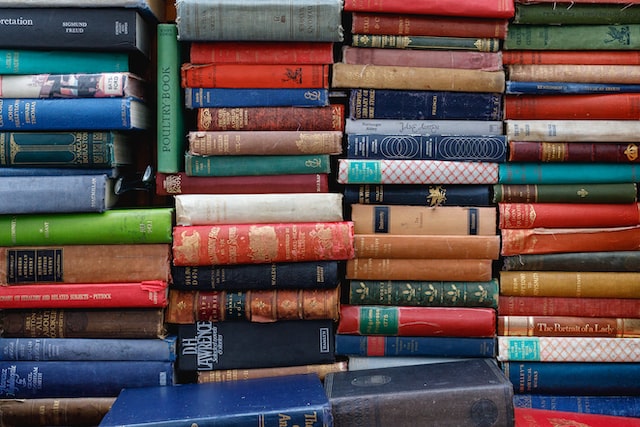Poetry is a form of writing that often employs rhythm and rhyme to create an aesthetically pleasing effect. It can be used for both serious and humorous purposes, and its popularity has only grown in recent decades. Prose, on the other hand, generally entails less poetic embellishment and relies more on clear communication of the author’s thoughts.
Poems Vs. Prose – Key differences
(Photo by Max Muselmann on Unsplash )

Poems are typically written in metered verse, which allows for greater expression of emotion and complexity of thought. Prose is typically written in unmetered sentences, which lends a more concise and direct style. Poems often use images and symbols to evoke a visceral response, while prose is more likely to be devoid of such embellishment. Poems can be read aloud or silently, while prose tends to be read more slowly. Finally, poems may be appreciated on their own merits or used as the foundation for discussions or further reading, while prose and poetry both can be enjoyed on their own merits.
Poetry and prose are both forms of written expression, but they differ in several key ways. Poetry typically focuses on expressing emotions, ideas, or experiences using language that is carefully crafted and often includes rhyme, meter, and other literary devices to create a musical or rhythmic effect. Prose, on the other hand, is a more straightforward form of writing that focuses on the narrative and conveys information or tells a story in a direct and simple manner.
In terms of structure, poems often have a distinct pattern of lines and stanzas, while prose is written in paragraphs and sentences. Poets also have more freedom to play with language, using figurative language, imagery, and other literary devices to create a rich and evocative experience for the reader. In contrast, prose writers tend to rely on straightforward language and a straightforward narrative structure.
Another key difference between poetry and prose is their tone and style. Poetry often has a more elevated and serious tone, while prose can be more informal and conversational. The style of a poem is also often more imaginative and symbolic, while prose is typically more straightforward and direct.
In conclusion, while both poetry and prose serve the purpose of conveying information and emotions through writing, they differ in terms of structure, language, tone, and style. Poetry is a more imaginative and musical form of writing that focuses on emotions and ideas, while prose is a straightforward form of storytelling that focuses on conveying information.
Definitions of Poetry and Prose
Poetry is a form of writing that employs rhythm, meter, and rhyme to convey a message. Prose, on the other hand, generally lacks these elements and is written in a straight-forward manner. Poetry can be found in any form or genre, while prose is typically found in non-fiction or narrative forms.
The Elements of Poetry
(Photo by Nick Fewings on Unsplash )

Poetry is a form of writing that employs rhythm and meter to convey emotion. It typically refers to the works of ancient cultures, like the Iliad and Odyssey, which are often lengthy and complex. Poems are also written for pleasure, rather than for publication or educational purposes.
The Elements of Prose
prose is a type of writing that employs clear, concise, and organized sentences. It is often used to convey information or ideas, whereas poems are typically literary works that use rhythm and meter to create a mood or feeling. Prose also tends to be less formal than poetry, which might make it more readable and approachable.
How to Tell the Difference Between Poems and Prose
Here are some key differences between poems and prose that can help distinguish between the two:
- Structure: Poems often have a distinctive pattern of lines and stanzas, while prose is written in paragraphs and sentences.
- Rhyme and meter: Poetry often uses rhyme and meter to create a musical effect, while prose does not typically use these devices.
- Imagery: Poetry often employs rich, imaginative language to create vivid images in the reader’s mind, while prose is generally more straightforward and descriptive.
- Tone: Poetry often has a more elevated and serious tone, while prose can be more informal and conversational.
- Style: Poetry is often more symbolic and imaginative, while prose is typically more straightforward and direct.
- Purpose: Poetry is often used to express emotions, ideas, or experiences, while prose is used to tell stories or convey information.
By considering these differences, you can get a better sense of whether a piece of writing is a poem or prose.
What are the similarities between prose and poetry?
Despite their differences, there are some similarities between prose and poetry:
- Language: Both prose and poetry use language as a tool for communication and self-expression.
- Creativity: Both forms of writing allow for creativity and imagination in the use of language and expression of ideas.
- Emotion: Both prose and poetry can evoke emotions in the reader and are often used to express personal feelings and experiences.
- Storytelling: Both forms of writing can be used to tell stories, whether they be fictional or non-fictional.
- Literary Devices: Both prose and poetry can utilize literary devices such as imagery, metaphor, and symbolism to enhance the meaning and impact of their words.
Overall, while poetry and prose differ in terms of structure, language, tone, and style, both forms of writing serve the purpose of conveying information and emotions through language.
What are the types of poetry?
There are many types of poetry, including:
- Sonnet: A 14-line poem with a strict rhyme scheme and rhythm.
- Haiku: A Japanese form of poetry that consists of three lines, the first and third having five syllables, and the second having seven syllables.
- Lyric: A type of poetry that expresses personal feelings and emotions.
- Epic: A long narrative poem that tells the story of a hero’s deeds and adventures.
- Free verse: A type of poetry that does not follow a strict rhyme or meter pattern.
- Villanelle: A 19-line poem that follows a strict rhyme and repetition pattern.
- Slam: A type of poetry that is performed in front of a live audience.
- Limerick: A humorous, five-line poem with a distinctive rhyme and rhythm pattern.
- Ode: A type of poem that pays tribute to a person, place, or thing and often uses elevated language.
These are just a few of the many types of poetry. Each type has its own unique characteristics and conventions, allowing poets to explore a wide range of themes and styles in their writing.
What are the types of prose?
There are several types of prose, including:
- Narrative: Prose that tells a story or series of events, including novels, short stories, and biographies.
- Descriptive: Prose that focuses on describing a person, place, or object, often using vivid and imaginative language.
- Expository: Prose that explains or informs, including essays, articles, and instructional writing.
- Persuasive: Prose that tries to convince the reader of a particular point of view, including speeches, advertisements, and argumentative essays.
- Lyric: Prose that expresses personal feelings and emotions, often in a musical or rhythmic style.
- Historical: Prose that recounts past events and helps to preserve a record of history.
- Scientific: Prose that explains scientific concepts, theories, and research findings, including textbooks, academic journals, and research papers.
- Creative: Prose that uses imaginative language and techniques to create a literary work of fiction or non-fiction.
These are just a few of the many types of prose. Each type has its own unique style and purpose, allowing writers to express themselves in a variety of ways and connect with different audiences.
Who are some of the most famous prose writes?
Here are brief descriptions of some of the most famous prose writers:
William Shakespeare – Shakespeare is widely regarded as one of the greatest writers in the English language. His plays, such as Romeo and Juliet, Hamlet, and Macbeth, are considered masterpieces of English literature and have been performed and studied for centuries.
Jane Austen – Jane Austen was an English novelist known for her witty and sarcastic commentary on the social norms of her time. Her novels, such as Pride and Prejudice and Sense and Sensibility, are beloved by millions of readers and are considered classic works of English literature.
Charles Dickens – Charles Dickens was a prolific English novelist who wrote about the harsh realities of life in 19th-century England. His works, such as Great Expectations, Oliver Twist, and A Tale of Two Cities, are renowned for their vivid characterizations and social commentary.
Mark Twain – Mark Twain was an American author and humorist who wrote about the American frontier and his experiences growing up along the Mississippi River. His novels, such as The Adventures of Tom Sawyer and Adventures of Huckleberry Finn, are considered masterpieces of American literature and are widely read and studied.
Fyodor Dostoevsky – Fyodor Dostoevsky was a Russian novelist and philosopher who wrote about the human condition and the struggles of the individual in a rapidly changing world. His novels, such as Crime and Punishment and The Brothers Karamazov, are considered masterpieces of Russian literature and are widely read and studied.
Ernest Hemingway – Ernest Hemingway was an American author and journalist who wrote about war, adventure, and the human condition. His novels, such as A Farewell to Arms and The Old Man and the Sea, are considered masterpieces of American literature and are widely read and studied.
Gabriel García Márquez – Gabriel García Márquez was a Colombian novelist and journalist who wrote about the magic and mystery of Latin America. His novel One Hundred Years of Solitude is widely considered one of the greatest works of 20th-century literature and is widely read and studied.
These are just a few of the many famous prose writers who have left a lasting impact on the world of literature.
Who are some of the most famous poets?
Here are brief descriptions of some of the most famous poets:
William Shakespeare – Shakespeare is widely regarded as one of the greatest poets in the English language. He is known for his sonnets, which explore themes of love, beauty, and mortality, and his narrative poems, such as “Venus and Adonis” and “The Rape of Lucrece.”
Robert Frost – Robert Frost was an American poet who wrote about the rural landscape of New England and the human condition. His poems, such as “The Road Not Taken” and “Stopping by Woods on a Snowy Evening,” are known for their simplicity, depth, and beauty.
Emily Dickinson – Emily Dickinson was an American poet who wrote about death, love, and nature. Her poems, which were largely unpublished during her lifetime, are now considered some of the greatest examples of American poetry.
Walt Whitman – Walt Whitman was an American poet who wrote about democracy, nature, and the human soul. His poems, such as “Leaves of Grass” and “O Captain! My Captain!”, are considered masterpieces of American poetry and are widely read and studied.
Percy Bysshe Shelley – Percy Bysshe Shelley was an English poet who wrote about revolution, love, and the human spirit. His poems, such as “Ozymandias” and “To a Skylark,” are considered masterpieces of Romantic poetry and are widely read and studied.
T.S. Eliot – T.S. Eliot was an American poet who wrote about modernity, tradition, and the human condition. His poem “The Waste Land” is considered one of the greatest poems of the 20th century and is widely read and studied.
Maya Angelou – Maya Angelou was an American poet who wrote about race, identity, and the human experience. Her poems, such as “Still I Rise” and “I Know Why the Caged Bird Sings,” are considered masterpieces of African American poetry and are widely read and studied.
These are just a few of the many famous poets who have left a lasting impact on the world of literature.
How does one start writing prose?
Starting to write prose can be a daunting task, but it can also be incredibly rewarding. To begin writing prose, you first need to choose a subject or theme that you are interested in or have a strong connection to. This could be a personal experience, a fictional story, a topic you’re knowledgeable about, or anything else that strikes your fancy. Once you have a subject in mind, it can be helpful to plan out the basic structure of your piece, such as the beginning, middle, and end. From there, you can start to flesh out the details and characters, and consider the tone and style you want to use. As you write, don’t be afraid to revise and edit your work. Writing is a process, and it takes time to perfect. The most important thing is to be creative, have fun, and let your imagination soar.
How does one start writing poetry?
Starting to write poetry can seem like a daunting task, but with a little practice and imagination, anyone can become a successful poet. To get started, consider what themes or experiences you want to explore in your writing. You might choose to write about personal experiences, emotions, or observations of the world around you. It can also be helpful to consider the tone and mood you want to create in your poetry. Experiment with different forms, such as sonnets, haikus, or free verse, to see what feels the most natural and expressive for you. As you write, try to use language in unique and evocative ways, whether through the use of metaphor, imagery, or other poetic devices. Don’t be afraid to revise and edit your work, as writing poetry is a process that often requires several drafts. The most important thing is to be creative, have fun, and let your imagination soar.
Featured Image By – Photo by Ed Robertson on Unsplash









